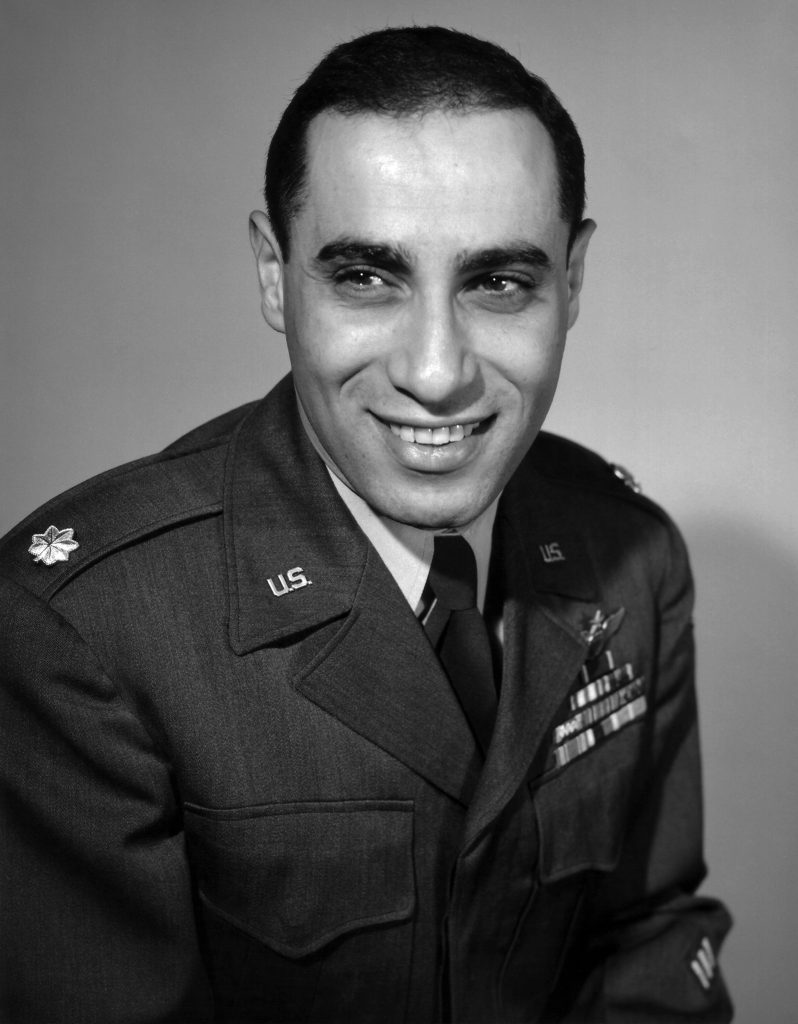In honor of April being Arab American Heritage Month we want to introduce you to some of the Arab American men and women who have had a deeply meaningful impact in history. This week we turn to an American hero and the country’s first jet ace pilot, Colonel James “Jabby” Jabara.

James Jabara c.1950, Wikipedia.
United States Air Force Colonel James Jabara was born on October 10, 1923. An Arab-American born in Muskogee, Oklahoma, with family ties to Marjayoun, Lebanon, Jabara was raised in Wichita, Kansas. Proud of his midwestern roots, he would often refer to himself as a “Kansas farm boy.” Growing up, Jabara helped his father with their family-owned grocery store, but he always had dreams of doing loftier things. Reading articles and books about air combat, by the time he was in sixth grade, Jabara aspired to become a fighter pilot.
After graduating from North High School in May of 1942, Jabara wasted no time in enlisting in the aviation cadet program for the United States Army Air Corps at Fort Riley, Kansas. Despite being somewhat shorter than the average pilot at the time (he stood at 5’5”) and needing corrective lenses, Jabara earned his pilot wings and a commission as a second lieutenant in the US Army Air Forces in 1943 at Moore Field, Texas. With World War II still in full swing, there was no time to waste. Jabara was sent to join the 363rd Fighter Group of the Ninth Air Force stationed in England in January 1944.
Jabara flew over 100 European missions during WWII and did it all before he ever even turned 20. His courage and drive were legendary, and he attributed much of it to his time working in his father’s grocery store and the time he spent in the Boy Scouts of America. However, he was not just courageous, he was also a man who believed in respect and honor. In one incident, Jabara and a German pilot collided in mid-air. Although the aircrafts were destroyed, both men were able to safely float to the ground. Once on the ground, Jabara shook the German soldier’s hand in recognition of their shared bravery. Jabara maintained that he was not a “killer by instinct” and that he saw air combat as a business he was trained in.
After WWII, Jabara served in Korea, and it was while serving in Korea that he solidified his spot in history by becoming the first American jet ace. A jet ace, also known as a flying ace, fighter ace, or air ace, is a term reserved for military pilots who have shot down at least five enemy aircraft during aerial combat. Jabara earned this honor while serving in the 334th and 335th Squadron. The 335th’s pilots threw a party in his honor to celebrate the momentous occasion, though Jabara was quick to point out that he only narrowly escaped danger in the event by not waiting for his wingman to cover him prior to his attack on the Chinese pilots.
The day after earning his ace title, Jabara was relieved of combat duty, and the day after that, May 22, 1951, he was awarded the Distinguished Service Cross by General Partridge. Jabara returned to the states and was sent on a publicity tour as the U.S. Air Force’s first Korean War air hero. He even got a song written about him, “That Jabara Bird.” He and his father were both featured on the radio and television shows nationally. After the publicity tour, Jabara was transferred to the Air Training Command at Scott Air Force Base, Illinois, where he helped train fighter pilots stateside.
Sadly, in 1966, at the age of 42, making him the youngest colonel in the Air Force at the time, Jabara lost his life in a car accident in Florida. He was preparing to leave for a combat tour in Vietnam at the time.
Jabara, the son of a Lebanese immigrant and grocer, has left a legacy as one of the most revered pilots in American military history. His name can be found prominently on the Colonel James Jabara Airport outside of Wichita, Kansas, and every year since 1968, the U.S. Air Force Academy alumni association has bestowed the Jabara award upon the graduate who demonstrates superior performance in fields directly involved with aerospace vehicles. Popular Mechanics has even named him one of the seven greatest flying aces in history.
To learn more about Arab American Heritage Month and Arab culture, you can visit the Arab America Foundation or arabamerica.com.
References
Allmon, W. B. (2006). How captain James Jabara became the first American ace of the Korean War. HistoryNet, https://www.historynet.com/captain-james-jabara-ace-of-the-korean-war/?f
Bennett, J. (2015). 7 of the greatest flying aces throughout history. Popular Mechanics, https://www.popularmechanics.com/flight/g2323/greatest-flying-aces/
Dorr, R. F., & Borch, F. L. (2006). History in blue: Jabara was first U.S. jet ace. Navy Times, https://archive.ph/20130129143757/http://www.navytimes.com/community/opinion/airforce_60th_incredibleflights_070924w/
Patrick, B. K. (2012). Col. James Jabara. Military.com, https://web.archive.org/web/20121008213020/http://www.military.com/Content/MoreContent?file=ML_jabara_bkp